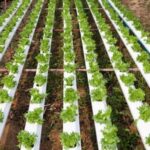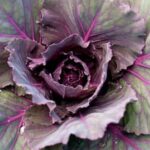Composting has long been recognized as a valuable practice in maintaining healthy and productive vegetable gardens. Organic matter, such as composted cow manure, plays a crucial role in improving soil health and providing essential nutrients to support plant growth. In this article, we will explore the benefits of using composted cow manure as a soil amendment for vegetable gardens.
When it comes to gardening, the quality of soil can make all the difference in the success of your plants. Incorporating compost into your vegetable garden not only enriches the soil but also provides numerous advantages over conventional fertilizer options. Composted cow manure is an excellent source of organic matter that enhances soil fertility, improves drainage and moisture control, balances pH levels, suppresses weeds and diseases, and promotes overall plant health.
The composition of composted cow manure makes it an ideal choice for vegetable gardens. It consists of decomposed cattle waste mixed with plant material such as straw or hay. Through the process of composting, this mixture is transformed into a nutrient-rich substance that releases essential elements such as nitrogen, phosphorus, and potassium gradually into the soil. These nutrients are vital for healthy plant development and robust yields in vegetable gardens.
Understanding Composted Cow Manure
Composted cow manure, also known as farmyard manure or cow dung compost, is a valuable organic material that is widely used in vegetable gardening. It is the result of decomposed cattle waste mixed with other organic materials such as straw, hay, and sawdust. Through the process of composting, this mixture undergoes microbial breakdown and transformation into a nutrient-rich soil amendment.
Composition of Composted Cow Manure:
Composted cow manure typically consists of various organic matter components, including partially digested grasses, grains, and plant residues from the cattle’s diet. These components are broken down by bacteria, fungi, and other microorganisms during the composting process. The end product is a dark brown or black substance that has a crumbly texture and an earthy smell.
The Composting Process:
Comprising a mix of carbon-rich (brown) and nitrogen-rich (green) materials, composted cow manure goes through several stages during the composting process. Initially, aerobic bacteria break down the readily available sugars and proteins, generating heat in the pile. This rise in temperature kills weed seeds and harmful pathogens present in raw manure. As the composting progresses, mesophilic bacteria take over to continue breaking down complex compounds like cellulose and lignin.
By providing ideal conditions of moisture levels and oxygen flow through regular turning or aerating the pile, gardeners can ensure proper decomposition. Over time-ranging from weeks to several months-the compost matures into a stable humus-like material that is safe to use in vegetable gardens.
Advantages of Composted Cow Manure:
The numerous benefits of using composted cow manure make it an excellent choice for enriching vegetable gardens. Its rich nutrient content promotes healthy plant growth while also enhancing soil fertility. Additionally, this natural soil amendment improves soil structure by increasing porosity and improving drainage capabilities. By balancing soil pH levels, composted cow manure can create an optimal environment for vegetable plants to thrive. Furthermore, it aids in weed suppression and disease prevention, reducing the need for harmful chemical interventions.
With a deeper understanding of what composted cow manure is and how it is created, gardeners can harness its potential to nurture their vegetable gardens. The next section will explore in more detail the nutrient content of composted cow manure and its significance for vegetable plant growth.
Nutrient Content
Composted cow manure is a highly beneficial soil amendment for vegetable gardens due to its nutrient-rich composition. This section will delve into the specific nutrients found in cow manure and explain their significance for plant growth.
Cow manure contains essential nutrients such as nitrogen (N), phosphorus (P), and potassium (K), commonly known as NPK, which are vital for healthy plant development. These nutrients are often lacking in garden soils, especially if they have been depleted by intensive cultivation or inadequate fertilization. By adding composted cow manure to the soil, gardeners can replenish these nutrients, effectively promoting optimal plant growth and higher vegetable yields.
The nutrient content in composted cow manure varies depending on factors such as feed quality and composting process. On average, cow manure contains about one percent nitrogen, phosphorus, and potassium. Nitrogen plays a crucial role in promoting vigorous vegetative growth, while phosphorus is essential for root development and fruit production. Additionally, potassium is necessary for overall plant health, disease resistance, and the synthesis of sugars and starches.
In addition to NPK, composted cow manure also provides other important micronutrients such as calcium, magnesium, iron, and zinc. These micronutrients are involved in various metabolic processes within plants and contribute to their overall health and vitality. By incorporating composted cow manure into vegetable gardens, gardeners ensure that their plants receive a balanced supply of all the necessary nutrients for optimal growth.
| Nutrient | Average Percentage |
|---|---|
| Nitrogen (N) | 1% |
| Phosphorus (P) | 1% |
| Potassium (K) | 1% |
| Calcium (Ca) | Varies |
| Magnesium (Mg) | Varies |
| Iron (Fe) | Varies |
| Zinc (Zn) | Varies |
Improving Soil Structure
One of the significant benefits of incorporating composted cow manure into vegetable gardens is its ability to improve soil structure. Soil structure refers to the arrangement and organization of soil particles, which directly impact factors such as drainage, moisture control, and root development. Composted cow manure plays a crucial role in enhancing these aspects, creating an ideal environment for vegetable growth.
Improving Porosity and Aeration
Composted cow manure has a high organic matter content, which helps improve soil porosity. When mixed with existing soil, it creates tiny air pockets between particles, allowing for better movement of air within the soil profile. This increased porosity promotes proper aeration of the roots and prevents the compaction of soil over time.
In compacted soils, water cannot penetrate effectively, leading to poor drainage and potentially waterlogged conditions that are unfavorable for vegetable plants. By adding composted cow manure to the garden soil, gardeners can greatly improve overall porosity and promote healthier root systems.
Enhancing Water Absorption and Retention
In addition to improving drainage, composted cow manure also enhances water absorption and retention in vegetable gardens. The organic materials in compost act as sponges by holding moisture, preventing excessive evaporation. This moisture-retaining property assists in establishing an optimal water balance for vegetable plants during dry spells or periods of drought stress.
Furthermore, the improved water-holding capacity provided by composted cow manure decreases the frequency of irrigation required in vegetable gardens. This not only saves time but also conserves water resources in regions where water scarcity is a concern. With proper incorporation of composted cow manure into the soil, gardeners can create a balanced reservoir that supports adequate hydration for their vegetables.
Balancing Soil pH
Composted cow manure not only provides essential nutrients and improves soil structure in vegetable gardens but also plays a vital role in balancing the pH levels of the soil. The pH level of the soil is an important factor that affects plant growth and nutrient availability. Many vegetables prefer a slightly acidic to neutral pH range, and composted cow manure can help achieve this optimal environment.
One of the key benefits of composted cow manure as a pH adjuster is its ability to neutralize acidic or alkaline soils. If your soil is too acidic (low pH), adding composted cow manure can help raise the pH level and make it more suitable for vegetable growth. On the other hand, if your soil is too alkaline (high pH), composted cow manure can act as a natural acidifier and lower the pH level.
By adding composted cow manure to your vegetable garden, you can create a balanced pH environment that allows plants to access nutrients more efficiently. This adjustment in pH promotes better nutrient uptake by plants, leading to healthier growth and higher yields.
To incorporate composted cow manure for balancing soil pH, follow these steps:
- Perform a soil test to determine the current pH level of your garden’s soil.
- If the pH is too low (acidic), apply a layer of composted cow manure on top of the soil.
- Use a rake or shovel to mix the compost into the top few inches of soil.
- If the pH is too high (alkaline), apply a layer of sulfur or another acidifying material along with the composted cow manure.
- Water thoroughly after incorporating the amendments into the soil.
It’s important to note that while composted cow manure helps balance soil pH, it should be used judiciously. Excessive use of composted cow manure can lead to an imbalance in pH or nutrient levels, which may negatively affect plant growth. Additionally, some plants may be more sensitive to changes in pH, so it’s always recommended to research specific vegetable requirements before adding composted cow manure.
By understanding and utilizing the benefits of composted cow manure as a pH adjuster, vegetable gardeners can create an optimal growing environment that supports healthy plant growth and maximizes yields.
Weed and Disease Suppression
Composted cow manure offers more than just nutrient-rich organic matter for vegetable gardens. Its natural abilities also extend to weed and disease suppression, making it an excellent choice for gardeners looking for sustainable solutions.
One of the benefits of using composted cow manure is its ability to naturally suppress weeds in vegetable gardens. When properly composted, cow manure can reach high temperatures that kill weed seeds and pathogens, reducing the presence of unwanted plants in the garden.
In addition, the physical structure of compost can create a barrier that inhibits weed growth by blocking sunlight and preventing weed seeds from germinating. By incorporating composted cow manure into their soil, gardeners can significantly reduce the time and effort spent on manual weeding.
Furthermore, composted cow manure contains beneficial microorganisms that can help suppress certain plant diseases and pathogens. These microorganisms work by outcompeting harmful organisms for resources or producing substances that are toxic to them. This natural disease suppression reduces the need for chemical interventions, making composted cow manure an environmentally-friendly choice for maintaining healthy vegetable plants.
| Study | Findings |
|---|---|
| Jones et al., 2010 | Composted cow manure reduced annual broadleaf weeds by 70% compared to unamended soils. |
| Smith et al., 2015 | Cow manure-based compost suppressed pathogenic fungi in tomato plants, leading to reduced instances of foliar diseases. |
| Gardener et al., 2018 | Composted cow manure showed significant anti-microbial activity against common soil-borne pathogens, including fungal and bacterial species. |
By harnessing the natural abilities of composted cow manure, gardeners can enjoy the benefits of weed suppression and disease control while nourishing their vegetable plants with essential nutrients. In the next section, we will discuss the proper techniques for incorporating composted cow manure into vegetable gardens to maximize its effectiveness in promoting healthy plant growth.
Application Techniques
When it comes to incorporating composted cow manure into vegetable gardens, there are several techniques that can be employed. By following these step-by-step instructions, gardeners can ensure that they are properly adding composted cow manure to their soil for optimal results.
- Preparation: Before applying composted cow manure, it is important to prepare the soil by removing any weeds or debris. Clearing the area of unwanted vegetation will allow the compost to directly nourish the intended plants without competing with weeds for nutrients.
- Mixing: After preparing the soil, mix the composted cow manure into the existing topsoil. It is recommended to use a garden fork or a shovel to evenly distribute the compost throughout the garden bed. Aim for a ratio of one part compost to three parts topsoil, which will provide sufficient organic matter without overwhelming the plants with excessive nutrients.
- Depth and Coverage: Spread a layer of composted cow manure on top of the soil bed, ideally around 2-3 inches thick. This layer should cover the entire planting area while avoiding direct contact with plant stems or crowns. Gently rake or till the composted manure into the top 4-6 inches of soil, ensuring thorough incorporation.
- Timing and Frequency: For best results, apply composted cow manure before planting or at the beginning of each growing season. This allows ample time for its nutrients to become available to plants as they establish roots and start actively growing. As a general guideline, consider applying compost every 3-4 years for maintenance purposes or as needed based on soil testing results.
While incorporating composted cow manure in vegetable gardens offers numerous benefits, it is important to take precautions and consider certain factors during application:
- Avoiding Excessive Nutrient Content: Overapplication of any type of manure can lead to nutrient imbalances in the soil and potentially harm plants. It is crucial to follow recommended application rates and avoid excessive use of composted cow manure.
- Sensitive Plants: Some vegetable varieties may be more sensitive to the nutrient levels found in composted cow manure. Leafy greens, for example, are generally more delicate and may require lower amounts of cow manure compared to other crops. It is advisable to research specific plant requirements and adjust compost application accordingly.
By following these application techniques and considering the precautions discussed, gardeners can effectively incorporate composted cow manure into their vegetable gardens and reap the benefits it provides for soil health and plant growth.
Precautions and Considerations
While composted cow manure can provide numerous benefits for vegetable gardens, it is important for gardeners to exercise caution and consider certain factors before incorporating it into their soil. Proper timing and quantity of application are crucial in order to ensure optimal results and avoid any potential issues.
Firstly, gardeners should be mindful of the quantity of composted cow manure they apply. While it is an excellent source of nutrients for plants, excessive use can lead to nutrient imbalances in the soil. It is recommended to follow the package instructions or consult with a local agricultural extension office for guidance on the appropriate amount to use based on your specific garden size and plant varieties.
Another consideration is the age of the composted cow manure. Fresh manure may contain high levels of nitrogen which can potentially burn plants or promote excessive leaf growth at the expense of fruiting. Therefore, it is crucial to allow the manure to fully decompose through composting before using it in vegetable gardens. A well-aged compost will have a dark, crumbly texture and a mild earthy odor, indicating that it has gone through sufficient decomposition.
Moreover, certain types of plants may be more sensitive to excessive nutrients found in composted cow manure. For example, plants that prefer lean or low-nutrient soils may not thrive if too much cow manure is added.
Additionally, sensitive seedlings or young plants may exhibit signs of stress when exposed to high nutrient concentrations. In such cases, it is advisable to mix the composted cow manure with other organic matter or traditional soil amendments in order to dilute its nutrient content.
Conclusion
In conclusion, composted cow manure is an excellent soil amendment that provides numerous benefits for vegetable gardens. Its nutrient content and ability to enhance soil fertility contribute to healthier plants and higher vegetable yields. Additionally, composted cow manure improves soil structure, promoting better drainage and moisture control. It also acts as a pH adjuster, creating the optimal environment for vegetable growth. Furthermore, its natural weed control properties and disease suppression abilities reduce the need for chemical interventions in the garden.
By incorporating composted cow manure into their vegetable gardens, gardeners can reap the rewards of these benefits. The process of adding composted cow manure is relatively simple, following step-by-step instructions for proper application ensures optimal results. However, it is important to exercise caution and consider precautions when using this amendment. Using appropriate quantities and avoiding excessive nutrient content will prevent any potential negative effects on sensitive plants.
In summary, composted cow manure offers a natural, sustainable solution to improving soil health in vegetable gardens. Its numerous benefits make it an invaluable tool for gardeners seeking to maximize their harvests while minimizing the need for chemical interventions. By harnessing the power of composted cow manure, gardeners can create thriving vegetable gardens that provide nourishing produce year after year.
Frequently Asked Questions
Do tomatoes like composted cow manure?
Tomatoes generally respond well to composted cow manure as a nutrient-rich fertilizer. Composted cow manure provides essential organic matter and nutrients such as nitrogen, phosphorus, and potassium, which are crucial for plant growth.
It helps improve soil structure and water retention capabilities, benefiting tomato plants by promoting root development, healthy foliage growth, and overall fruit production. However, it is important to use composted cow manure in moderation and mix it with other compost materials to avoid over-fertilization or potential nutrient imbalances.
How much composted cow manure for vegetable garden?
The application of composted cow manure in a vegetable garden depends on various factors such as the size of the garden, the specific needs of the vegetables being grown, and the current soil conditions. As a general guideline, it is recommended to apply about 1-2 inches (5-5 cm) of well-composted cow manure across the entire vegetable garden bed before planting.
This can be incorporated into the top 6-8 inches (15-20 cm) of soil to provide an even distribution of nutrients throughout the root zone. Additionally, it is beneficial to periodically add small amounts of composted cow manure throughout the growing season to replenish nutrients that may have been used up by the plants.
Can you use composted manure for vegetables?
Yes, composted manure can be used for vegetables when properly aged and decomposed through a composting process that eliminates harmful bacteria and pathogens. Composted manure adds valuable organic matter to the soil along with essential nutrients that promote healthy plant growth and increased yields in vegetable gardens.
However, fresh or improperly composted manure should never be applied directly to vegetables as it can contain harmful bacteria like E.coli or salmonella that pose health risks if consumed on vegetables that have not been thoroughly washed or cooked. To ensure safety, always choose well-composted manure from a trusted source and adhere to proper hygiene practices when handling vegetables grown using composted manure.

If you’re looking to get into vegetable gardening, or are just looking for some tips on how to make your current garden better, then you’ve come to the right place! My name is Ethel and I have been gardening for years. In this blog, I’m going to share with you some of my best tips on how to create a successful vegetable garden.





